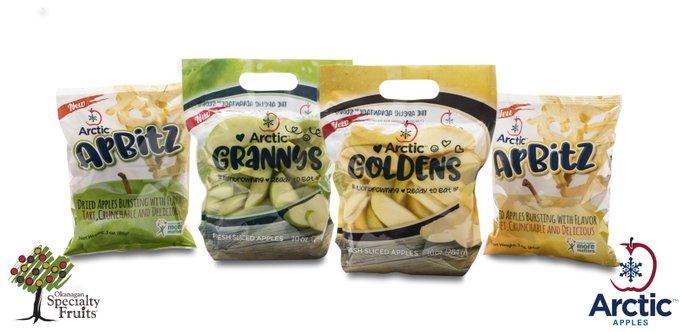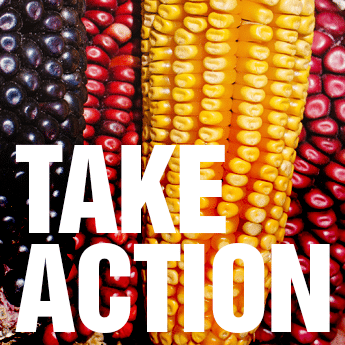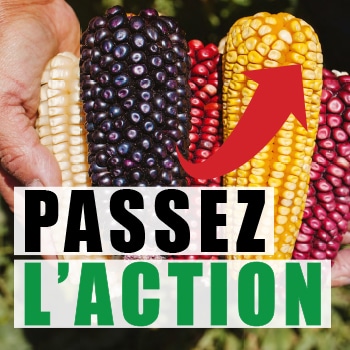Apple
Market Status
“At this time, Arctic apples are not being exported to Canada. Still, we continue to explore opportunities in the Canadian market that align with our sales and marketing strategies.” – Neal Carter, President and Founder, Okanagan Specialty Fruits, to the Canadian Biotechnology Action Network, February 11, 2025.
There are no genetically modified (GM or genetically engineered) non-browning apples sold in Canada at this time. The GM “Arctic” apple is currently only sold in slices, in the United States. Health Canada and the Canadian Food Inspection Agency have approved genetically engineered non-browning Fuji, Gala, Golden Delicious and Granny Smith apple varieties. GM apple orchards are established in Washington state, but none yet in Canada. The company now has a processing facility in Moses Lake, Washington that can produce more than 22.5 million kilograms of apples each year.
Take Action

Write to the head office of your grocery chain store
Ask your grocery store to keep GM apple slices out of prepared salads and fruit-trays, and GM apples out of the produce section. Click here for grocery store emails.
Background
The genetically modified “Arctic” non-browning apple (Golden Delicious and Granny Smith varieties) was approved in Canada in March 2015 but is not yet grown or sold in Canada. Health Canada also approved a GM “Arctic” Fuji variety in early 2018, and Gala in 2024. It is genetically engineered (genetically modified) to keep from going brown after being cut, for 28 days. The company Okanagan Specialty Fruits says the GM apples “have more eye appeal: no yucky browning.”
The GM apple is only grown in orchards in Washington state, U.S. The GM apple is only sold in the U.S., in a few stores, in small snack-size plastic bags of sliced apples and dried apple chips, and the company also says (2024) “Arctic apple 2 oz. bags slices are found in many K-12 nutritional programs” in the US.
69% of Canadians did not want the GM apple approved. Many groups fruit growers’ organizations in Canada were also opposed.
The technology was developed in Australia and licensed by the small BC company called Okanagan Specialty Fruits which was, until recently, owned by the US biotechnology company Intrexon but is now owned by Third Security.
The company has silenced a gene in the apple that controls browning by inserting modified apple DNA as well as genetic material from at least three different species:
- A regulatory gene switch from a plant virus (Cauliflower Mosaic virus promoter: CaMV 35S);
- A terminator sequence from a bacterium (Agrobacterium tumefaciens taken from its Nopaline synthase gene: nos);
- An antibiotic resistance marker gene from a bacterium (Streptomyces kanamyceticus), here the nptII gene (which confers resistance to the antibiotic kanamycin).
Why is it Controversial?
This is the world’s first genetically engineered (genetically modified or GM) apple.
- The GM apple is unnecessary. There are already non-GM techniques that industry and consumers use to slow browning after apples are cut (the industry uses ascorbic acid and the public uses lemon juice). Additionally, many varieties of apples are naturally slow-browning.
- At least 38% of Canadians do not want to eat the GM apple (according to a 2015 Ipsos Reid poll commissioned by CBAN). Before it was approved, 69% of Canadians don’t want the GM apple approved (according to a 2012 survey conducted for the BC Fruit Growers’ Association and the Quebec Apple Producers’ Association).
- The GM apple will not be labelled as genetically modified in Canada. The company says the apple will carry the company’s “Arctic” logo but this does not apply to foodservice sales.
- The GM apple threatens the market position for all apples. The BC Fruit Growers’ Association asked for a moratorium on approval of the GM apple to protect the market from consumer backlash and confusion.
- Possible GM contamination is a risk for apple producers. Organic growers are particularly concerned about contamination from GM apples because GM is prohibited in organic farming. In 2001, protests from BC apple growers stopped the GM apple from being field tested in Canada.
- Our government reviewed the safety of the GM apple based on company data that is kept confidential. The government did not consult with farmers and consumers, and did not consider economic or social concerns before it approved the GM apple.
“The GM apple risks the future of organic orchardists in BC, the markets for all BC apples, and the Okanagan’s reputation as a pristine fruit growing area.” – Letter from Okanagan groups to Okanagan Specialty Fruits August 13, 2012
Updates

GM Arctic Apples mascot “Artie” the furry apple.
March 2025: The GM apple company has launched a “kid friendly” mascot called “Artie” the furry apple, as company continues to seek markets for its genetically modified sliced apples in plastic bags, grown in the US. Not yet sold in Canada.
January 2025: Sarah Davidson Evanega of Okanagan Specialty Fruits has been appointed to the U.S. Department of Agriculture’s Fruit and Vegetable Industry Advisory Committee. She is one of 25 representatives along with Jenny Maloney of Bayer Vegetable Seeds. The mission of the advisory committee is to “evaluate industry challenges and opportunities and deliver actionable recommendations to the Secretary of Agriculture.”
May 2024: Okanagan Specialty Fruits has launched its own cider company called “Endless Orchard” based in East Wenatchee, Washington, to use the genetically modified Arctic apples “exclusively grown in Washington state”.
April 2024: Neal Carter, President and Founder of the GM apple company Okanagan Specialty Fruits, told the Canadian Biotechnology Action Network, “We are currently not selling Arctic® apples in Canada.”
April 2024: “There are no immediate plans to plant Arctic apple trees in the Okanagan,” says Neal Carter, President and Founder of the GM apple company Okanagan Specialty Fruits.
July 2020: For the first time, some GM apple has been sold in Canada. The GM apple company Okanagan Specialty Fruits told CBAN that, “Arctic apples were sold on a very limited basis in Canada through a food service outlet.” In August 2019, the company planned to sell large bags of pre-sliced apples for use in foodservice and has a webpage dedicated to promoting the apple slices to the foodservice industry.
January 2020: US company Intrexon has sold the company Okanagan Specialty Fruits which developed the genetically modified “non-browning” apple to TS Biotechnology Holdings, LLC, an affiliate of Third Security, LLC, owned by billionaire Randal Kirk. Third Security also bought AquaBounty from Intrexon, which developed the GM Atlantic salmon.
Press Release – May 26, 2014 – BC government refuses to carry out its promised review of the genetically engineered apple. This week Nicholas Simons, BC NDP agriculture critic, will present over 7,000 signatures gathered by the Society for a GE Free BC in 20 communities, calling for a moratorium on the GE apple. Simons also introduced two questions to the BC Legislature on May 12 asking for the review of the GE apple the government promised, with no response as yet.
Press Release – May 12, 2014: Grocers in BC say they will not sell the GM apple if it is approved for sale in Canada. Twenty retailers in the province have signed a no-GM apple commitment. The BC Fruit Growers Association does not support the GM apple, and over 69% of polled Canadians do not want it.
Update, November 7, 2013: McDonald’s and Gerber say no to GM apple
Government Regulation
The GM apple was approved in Canada in March 2015. It is also approved in the US.
In 2012, after the company first requested approval, the Canadian Food Inspection Agency provided a window of time to comment on the GM apple, but did not provide any details about the GM apple to comment on:
- Press Release – July 9, 2012: GM Apple Closer to U.S. Approval: Farce of Canadian public consultation exposed
- Read CBAN’s comments on the GM apple to the Canadian Food Inspection Agency here
- Read the letter to the Canadian Food Inspection Agency re: Public Process Lacking on Genetically Engineered Foods: Request to halt regulatory evaluation of GE “non-browning” apple, July 9, 2012
- Read the response from the Canadian Food Inspection Agency to CBAN September 6, 2017
For more information and analysis on government regulation of GMOs see CBAN’s GMO Inquiry report “Are GM Crops and Foods Well Regulated?”
GM Apple Marketing to High School Students
Summary: Teachers and students across Canada were invited to a live webinar on March 7, 2017 called “Trashing Food Waste with Technology” that is actually a promotion for the newly approved genetically modified apple. The webinar is part of ongoing public relations activities sponsored by the largest seed and pesticide companies in the world. The companies have organized a program called “Agriculture in the Classroom” which mixes education about farming with promotion of their products. The program is part of a larger national agri-food industry “social license” campaign to gain public trust in corporate agrochemicals and genetically modified products.
Webinar Materials: All webinar lesson plans and advertisements are linked here
Background: For details on the webinar see CBAN’s Bulletin Biotech Companies Promoting GM Apple to High School Students
- Press Release – March 5, 2017: Corporations in the Classroom: Groups alert Ministers to GM product placement disguised as education
- Letter to Ministers – March 5, 2017: RE: Product placement in the classroom in March 7 Live Webinar
- Press Release – March 3, 2017: Groups warn of corporations promoting genetically modified products in schools this March
March 4, 2017: CBC reported: “Johanne Ross, executive director of Agriculture in the Classroom, said she thinks the coalition is misunderstanding the content of the live streamed webinar. She said the focus is reducing food waste to improve the environment and increase food availability. The focus is not genetically modified food or the Arctic Apple, Ross said. .” But
- The webinar speaker is Jessica Brady, part of the marketing and communications team at the GM apple company
- The pre-webinar lesson plan for teachers says: “Explore the website to learn more about Arctic Apples – this will be the focus of the live stream event you and your class will be watching.”
 Resources
Resources
- Market Status Update – For Growers: GM Apples and Apple Trees in Canada. July 2020
- GM Apple Not Simple, CBAN Letter to the Editor, Published in the Western Producer, July 2012
- Taking the bite out of GM apples, by Lucy Sharratt, CBAN, Common Ground magazine, July 2012
- Apple Cravings, Harry Burton, Canadian Organic Growers, June 2012






